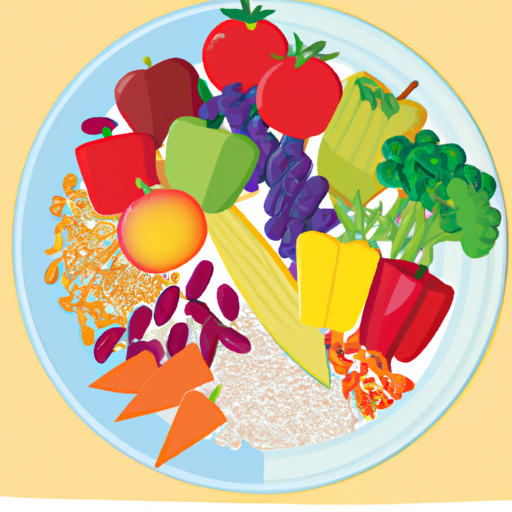In the quest for effective weight loss, many individuals often turn to fad diets or restrictive eating plans that promise quick results. However, one key component that is often overlooked is dietary fiber. While it may not be the most glamorous or talked-about aspect of weight loss, the role of dietary fiber in achieving and maintaining a healthy weight cannot be overstated. This article aims to shed light on the importance of dietary fiber in weight loss, explore a variety of fiber-rich foods that can aid in effective weight management, and delve into the science behind fiber and its impact on the weight loss journey. By understanding the significant role that dietary fiber plays in weight loss, individuals can make informed choices and develop sustainable strategies for achieving their weight loss goals.
1. "Understanding the Importance of Dietary Fiber in Weight Loss"
Understanding the Importance of Dietary Fiber in Weight Loss
In the quest for weight loss, many individuals often overlook the significance of dietary fiber. While it may not be the first thing that comes to mind when thinking about shedding pounds, dietary fiber plays a crucial role in supporting weight loss efforts. Understanding the importance of dietary fiber and incorporating it into our diets can make a significant difference in achieving and maintaining a healthy weight.
Dietary fiber, also known as roughage, refers to the indigestible parts of plant-based foods. Unlike other nutrients, such as carbohydrates, proteins, or fats, fiber is not broken down and absorbed by the body. Instead, it passes through the digestive system relatively intact, adding bulk to the stool and aiding in regular bowel movements.
One of the primary reasons dietary fiber is essential for weight loss is its ability to promote feelings of fullness and reduce appetite. High-fiber foods take longer to digest, causing a slower release of glucose into the bloodstream. This slower digestion process helps regulate blood sugar levels, preventing spikes and crashes that can lead to overeating or cravings for unhealthy snacks.
Moreover, because fiber absorbs water, it swells in the stomach, creating a sense of satiety and reducing hunger pangs. This natural appetite suppressant effect can be particularly beneficial for individuals trying to manage their calorie intake and avoid overeating. By increasing feelings of fullness, dietary fiber can contribute to consuming fewer calories overall, leading to weight
2. "Exploring a Variety of Fiber-Rich Foods for Effective Weight Management"
A key component in achieving successful weight loss is incorporating a variety of fiber-rich foods into your diet. Fiber not only aids in digestion, but it also helps to keep you feeling fuller for longer, reducing the temptation to overeat or snack on unhealthy foods. By exploring a wide range of fiber-rich foods, you can find options that suit your taste preferences and support your weight management goals.
One excellent source of dietary fiber is whole grains. These include foods such as brown rice, whole wheat bread, and oatmeal. Not only do whole grains provide a good amount of fiber, but they also offer important nutrients like vitamins, minerals, and antioxidants. By substituting refined grains with whole grains, you can increase your fiber intake while enjoying a satisfying and nutritious meal.
Legumes, such as beans, lentils, and chickpeas, are another category of fiber-rich foods that are highly beneficial for weight loss. These plant-based protein sources not only provide fiber but also help stabilize blood sugar levels and promote feelings of fullness. Incorporating legumes into your diet can be as simple as adding them to salads, soups, or stews, or even creating delicious bean-based spreads or dips.
Fruits and vegetables are a natural choice when it comes to fiber-rich foods. They not only offer a range of essential vitamins and minerals but are also packed with dietary fiber. High-fiber fruits include raspberries, apples, pears, and bananas, while vegetables
3. "The Science Behind Fiber and its Impact on Weight Loss Journey"
The science behind fiber and its impact on the weight loss journey is a fascinating subject that has gained significant attention in recent years. Numerous studies have shown that consuming foods rich in dietary fiber can be highly beneficial for individuals looking to shed those extra pounds.
Firstly, it is important to understand what dietary fiber actually is. Fiber is a type of carbohydrate that cannot be digested by the human body. Unlike other carbohydrates, fiber passes through the digestive system relatively intact. This unique characteristic of fiber plays a crucial role in weight loss.
One of the primary ways in which dietary fiber aids in weight loss is by promoting feelings of fullness or satiety. High-fiber foods tend to be more filling, which means that individuals are likely to consume fewer calories overall. When we feel full, we are less likely to indulge in unnecessary snacking or overeating, which can contribute to weight gain.
Additionally, fiber-rich foods have a lower energy density, meaning they have fewer calories per gram. This allows individuals to consume larger portions of these foods while still maintaining a calorie deficit, which is essential for weight loss. For example, a bowl of vegetables or a plate of whole grains can be more filling and satisfying than a smaller portion of a higher-calorie food.
Moreover, fiber has a significant impact on our digestive system. It helps regulate bowel movements, prevents constipation, and promotes a healthy gut microbiome. A healthy gut is essential for proper digestion and nutrient absorption
